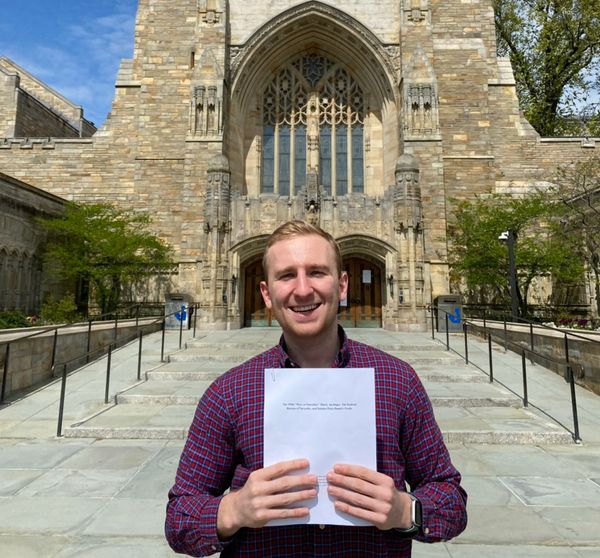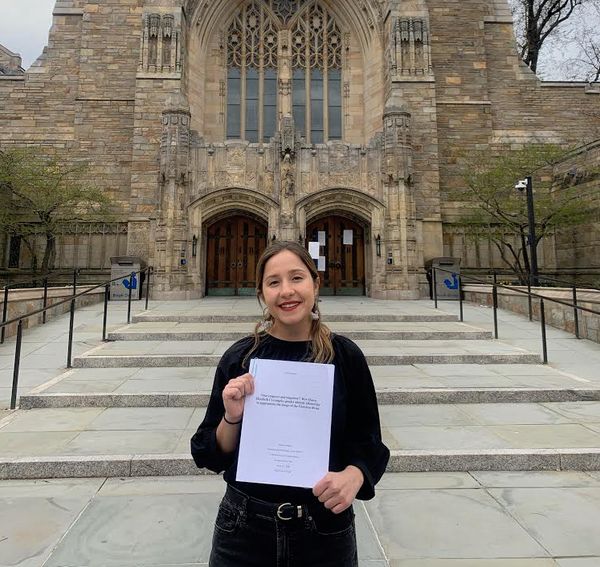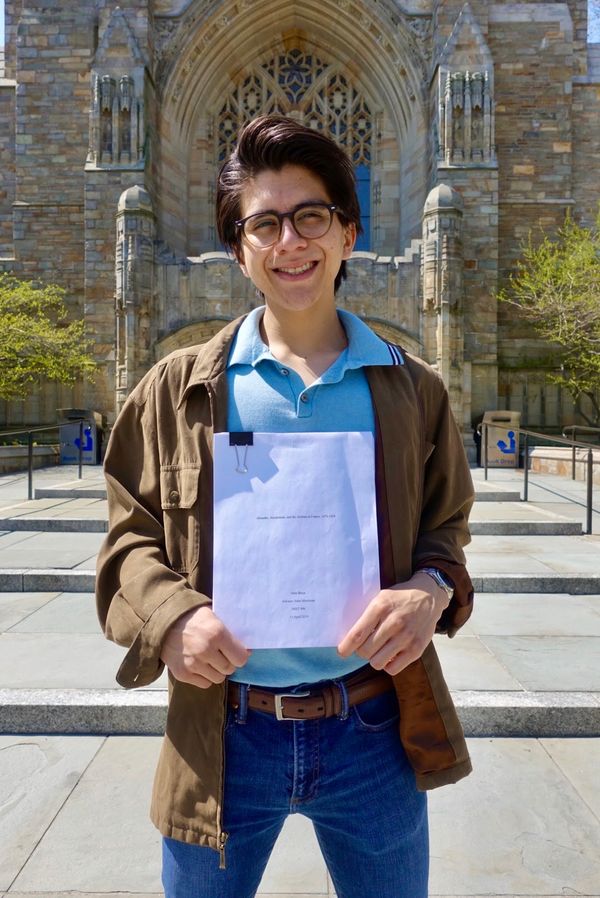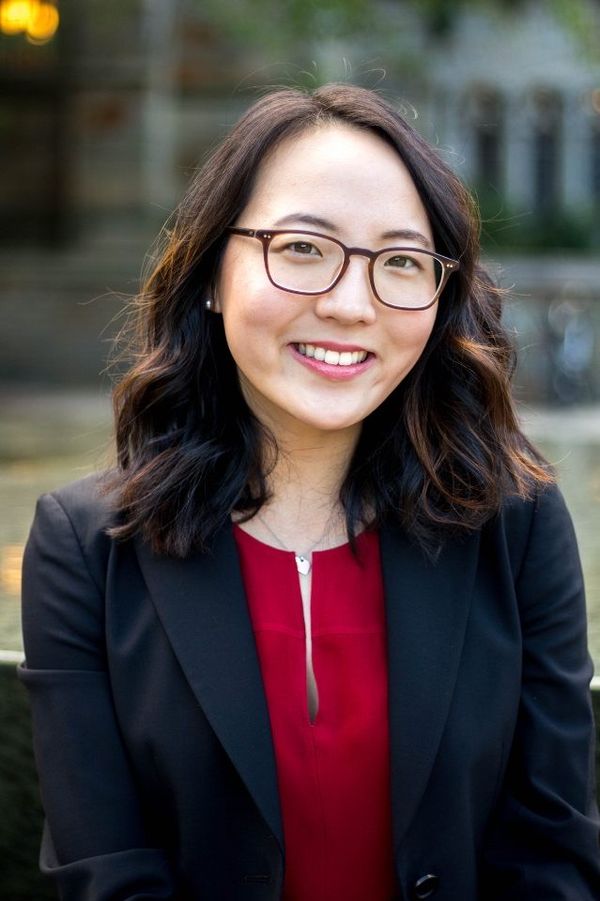Isabella Smeets sits down with Bebe Thompson, author of Statues of Liberty: Willy Meyer, William Halsted, and the Development of the Radical Mastectomy from 1880 to 1920.
Isabella Smeets (IS): To start off, I was wondering what inspired you to write about the development of the radical mastectomy from 1880 to 1920.
Bebe Thompson (BT): My interest in the topic really starts with a personal relationship to breast cancer. My grandmother, my great grandmother, and my great great grandmother all had breast cancer and underwent treatment for it. Breast cancer was always a topic amongst the women in my family, and I was interested in the disease not only from a scientific perspective, but also in relation to the impact it had on these women who I love so dearly. That's where my interest in the topic really began personally; but academically, it began in a seminar. I am an HSHM major (history of science, medicine and public health), and I took a seminar my junior fall that was called Engineering the Modern Body. We looked at the representations of bodies throughout history and how the disabled body or the sick body is viewed by not only the medical profession, but also by society as a whole. It was a research seminar, and the entire course focused on a research project, which is where I got the idea to link breast cancer and the radical mastectomy to this discussion about representations of the female body. That paper was really the launch pad for my thesis, which went deeper into the history of the procedure, but it also raised a lot of questions for me as to why Willy Meyer was rarely mentioned. Why wasn't he highlighted in more medical and secondary literature?
IS: If your junior seminar paper raised questions about the dominant historiography, then your thesis tried to answer them. In addition to inserting Meyer into scholarly discourse, you provide a detailed portrait of him as a surgeon and as a man.
In your introduction you speak about Meyer’s more compassionate and progressive attitude and Halsted’s cold, abrasive, and limiting one and the effects their attitude had on their medical practices. Was this observation one you held before going into your research or did you discover this significant and telling contrast during your research process?
BT:. I still really knew nothing about Willy Meyer, even after my research project in my junior fall. I wanted to learn more about him: where he came from, what motivated him. I definitely uncovered his unique approach and what drove that approach through research for my thesis. This meant looking into the New York city hospitals he worked at, reading all of his medical literature that I could find, and visiting archives to look at how he was mentioned in the notes from different meetings; I had to do things like that to gain a broader view and contextualize Meyer. But in terms of comparing Meyer to Halsted, that contrast really emerged as I delved into the history of the two men side by side.
IS: You definitely discovered some really interesting observations and questions when you researched Meyer and Halsted more thoroughly! I was also wondering, how did you go about conducting your research and writing? Did you have a specific process and do you have any advice to the prospective history of science and history medicine majors at Yale, who are thinking about their theses.?
BT: I actually have a funny anecdote. I consulted a lot of mentors and advisors before starting writing, asking how I can write a thesis in the most effective way possible. One piece of advice I received from Randi Hutter Epstein, a wonderful historian of medicine, was to have a full draft before spring break. She told me to go on spring break, take two weeks off, don’t look at your paper, and then come back to it for final edits before turning it in. For History and HSHM majors, we did have about two or three weeks after spring break before our theses were due. So, that was one thing I always had in the back of my mind: I wanted a full fledged, written thesis before spring break so that I could enjoy the vacation and return to my paper refreshed. In terms of the process, I had a body of literature that I had amassed from my prior project. I revisited that and talked to my advisor about what strings to pick up and pull out. The biggest tip I have is to read a lot. Get started on reading the summer before your project. Even if it's a very broad history! For example, if you're remotely interested in the history of surgery, pick up a broad history of surgery and see what you find interesting, especially if you still don't have a full fledged topic. What that looked like for me was that the summer before my senior year, I read a lot of robust histories of breast cancer and cancer in general, not just breast cancer surgery. I read Emperors of All Maladies, a fantastic history of cancer, and I took inventory, writing down brief notes about what had been established broadly, and then I dove into pieces more specifically related to my topic. I was constantly writing in a stream of consciousness style, organizing my thoughts. I did not have a very organized or diligent note-taking system, which I think might have been helpful, but I did help myself by starting really broad and really early.
IS: You spoke about professors helping during this process, and I was wondering about your advisor, Toby Appel and her role in shaping your thesis.
BT: I met Toby through the Medical Historical Library. She was the former Head Librarian at the Medical Historical Library at Yale School of Medicine. I had to look around a little bit for a research mentor. I had asked Randi Hutter Epstein if she would be interested, but she was writing a new book and did not feel she had the bandwidth to take on a student at the time. I consulted Melissa Grafe, who is the current head of the Medical Historical Library, and she introduced me to Toby. She has done extensive research in the history of women in medicine, and I found that was an important aspect to my research that I was picking up on. How did female physicians and patients play a role in this narrative I am uncovering? I was talking about two men but to be honest, I didn't want to be talking about the men, I wanted to be talking about the women on whom they operated. That was how we connected, and I met with her every week at the medical historical library. She was instrumental in helping me compile sources and think through my arguments. She read drafts, which not all advisors are willing to do. On the whole, she kept me focused and on pace, and we fostered a really deep and wonderful relationship throughout the process. I would definitely ask around who would fit your interests. Put in the work and the effort to have a relationship with your advisor because it is likely then they'll be willing to put in that same effort into your project.
IS: I was also wondering what compelled you to be a history of science and history of medicine major in the first place. Was it something you went into Yale knowing you wanted to do or did you stumble across it during your undergraduate career?
BT: There are a lot of physicians in my family, and I knew I wanted to do something science related, but I was never content with just learning the science. I always had questions about where medicine comes from and the people behind the medicine and the science. When I was in high school, I loved looking at old anatomy books, representations of the body, and what people thought the body looked like. My favorite was Benjamin Rifkin’s Human Anatomy: A Visual History from the Renaissance to the Digital Age. The ideas we learn in our biology classes, our chemistry classes, they all come from somewhere; they come from schools of thought or specific people, and knowing this, I was never content just learning the basic science. I always wanted to know more. It just felt natural for me to gravitate towards research in the history of medicine. The classes, professors, and major as a whole really, really enhanced my scientific studies and research. I do not want to be a physician who is unaware or uninterested in the history of my profession: both the achievements and also the many shortcomings that physicians and medicine have delivered.
IS: Speaking of being aware of the history of the scientific profession, does your thesis lead into your postgraduate work, and if so, how does it?
BT: Currently, I work in Clinical Research at the Maternal Fetal Medicine department at Yale, and a majority of our patients are minority women. It’s been an important aspect to my Yale education to have taken these history medicine classes where I learned about healthcare inequities and about the awful treatment of human subjects in research, especially women and minority groups. While conducting research, I'm keenly aware of the history behind what I am doing. The history of research at Yale harbors many of these injustices. Thus, knowing all of this and continuing to conduct research has definitely given new meaning to my job. I am not only conducting important clinical research, but also personally engaging with the profession in a way that differs from the things that deeply troubled me throughout my classes.
IS: It sounds like your thesis shaped your perception of medicine and your current job.
BT: I think it highlights the importance of patient care, communication, listening to, and protecting your patients and subjects, no matter if you're a postgraduate researcher or an attending physician. In my thesis, argue that, for his time when most physicians weren’t, Meyer was progressive in this way.
IS: Do you think that Meyer and the development of radical mastectomy should be more widespread in history of science curriculums? Even though it's more of a niche topic, do you think that it has a lot of takeaways that are very important for students?
BT: I think it definitely is critical to talk about the history of medicine, medical ethics, and the pioneers of procedures and innovations, especially one as ubiquitous as the mastectomy, in medical school curriculums. In terms of undergraduate education, I think it's a cool case study, but I would see this history more in the syllabus for medical student education and continuing medical education for residents and fellows. I'm preparing to submit my piece to journals that would be read by these types of people, because I think that it may be fascinating to read, especially for physicians who perform contemporary breast cancer surgery. Within the undergraduate history of medicine curriculum, there are so many niche topics like this that aren't explicitly taught in classes, but if one is interested in it, there are so many resources at Yale and people who can direct you in to how to conduct such an inquiry. You can do a project like this and expose the history of a specific surgery or a specific person and bring them to life again.
IS: Definitely. Those journals would be lucky to have your thesis! And finally, I was wondering, what was your favorite part of being history and science and history of medicine major at Yale?
BT: My favorite part is the faculty. My academic advisor for two years was the wonderful Professor Carolyn Roberts. Isabella, when you get to Yale, I would highly suggest taking one of her courses, even if you're not a history of medicine major. Toby and many other professors are so knowledgeable and so accomplished in their historical writing and analysis, but they are also so kind, passionate, and willing to help undergrads. My interest was fostered and embraced by these wonderful mentors and professors.





